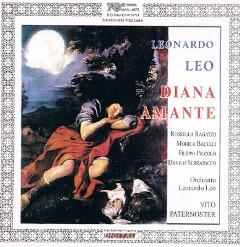Leonardo Leo - Diana amante (Paternoster) [1988]
Leonardo Leo - Diana amante (Paternoster) [1988]

1. Part I: Recitative: Proteo perche fra selve (Amore) 2. Part I: Aria: Sol chi ben ama (Amore) 3. Part I: Recitative: Amor, cui Giove in cielo (Proteo) 4. Part I: Aria: E' un bel piacer (Proteo) 5. Part I: Recitative: Dunque la Dea (Amore, Proteo) 6. Part I: Aria: Prato ameno (Endimione) 7. Part I: Aria: Sieguo l'orme (Diana) 8. Part I: Recitative: Goda pur altra (Diana) 9. Part I: Aria: Sempre meglio le belve piagare (Diana) 10. Part I: Recitative: Che fia? (Diana, Amore, Proteo) 11. Part I: Aria: Di quel labbro (Diana) 12. Part I: Recitative: Ohime si sveglia (Diana, Endimione, Amore, Proteo) 13. Part I: Duet: Che guardi? Che miri (Diana, Endimione) 14. Part I: Recitative: L'ardor che per quel volto (Diana, Endimione) 15. Part I: Aria: Se piagommi (Endimione) 16. Part I: Recitative: M'intenerisco (Diana, Proteo, Amore) 17. Part I: Aria: Offese, disprezzi (Amore) 18. Part I: Recitative: Pastor, datti pur vanto (Diana, Endimione, Proteo) 19. Part I: Aria: Amoretti vezzosetti (Proteo) 20. Part I: Recitative: Ma ognor cresce 'l mio foco (Diana, Endimione) 21. Part I: Quartet: Io parto, io resto (All) 22. Part II: Recitative: O come oltre l'usato (Amore, Proteo) 23. Part II: Aria: Corre la cerva all'onde (Proteo) 24. Part II: Recitative: Ma il cervo, l'ape, l'augellin (Amore, Proteo) 25. Part II: Aria: Ne le sue sponde (Amore) 26. Part II: Recitative: Troppo non dir tai sensi (Proteo, Amore) 27. Part II: Aria: Gran diva che siedi (Endimione) 28. Part II: Recitative: Di poco ei si contenta (Proteo, Amore, Diana, Endimione) 29. Part II: Aria:Ho provato allontanarmi (Diana) 30. Part II: Recitative: Ecco la Dea fra selve (Amore, Proteo, Diana) 31. Part II: Aria: Deh, non v'aprite (Diana) 32. Part II: Recitative:Vie piu s' accende ognor (Amore, Diana, Proteo) 33. Part II: Aria: Bacia il rio (Amore) 34. Part II: Recitative: Deh ti rallegra, o Dea (Proteo, Amore) 35. Part II: Aria: Il Dio guerriero (Amore) 36. Part II: Recitative: Sovente il mio german (Diana) 37. Part II: Aria: Donna illustre (Diana) 38. Part II: Recitative: Dunque un umil pastore (Endimione) 39. Part II: Aria: Gode e brilla (Endimione) 40. Part II: Recitative: Or sappiate che quanto (Proteo, Diana, Amore, Endimione) 41. Part II: Di Barbara il chiaro (All) Diana - Monica Bacelli, mezzo-soprano Proteo - Danilo Serraiocco, bass Endimione - Filippo Piccolo, tenor Amore - Rossella Ragatzu, soprano Leonardo Leo Orchestra Vito Paternoster, conductor (Recorded live 3 December 1988 in La Chiesa di San Giovanni, Brindisi)
Leonardo Leo (1694-1744), whose career took off around 1720, was a good two generations in advance of Mozart. Like most of his contemporaries, he was very prolific: Grove lists some sixty operas, the majority of them in the buffa genre. He was a leading figure in Neapolitan opera in his day, but, again like most of his contemporaries, his works barely outlived him. This was not a comment on the quality of his music, but on the nature of the operatic industry at the time which, almost the opposite of today’s, relied on the constant production of new works. Until recently, Leo’s operas were known only to a handful of music scholars, but as, after all, the market can only absorb so many recordings of Le nozze di Figaro and Così fan tutte, he has benefited from the general exploration of forgotten music that has been so remarkable a feature of the CD age. L’ambizione delusa is the fourth Leo opera to be recorded, the others being Amor vuol Sofferenza (1739), Decebalo (1743) and L’Alidoro (1740). For anyone interested in how his career developed, it is worth remarking a recording of his early dramatic serenata, Diana Amante (1717), too. None of the earlier recordings has made much impact and so far the attempt to revive interest in Leo has failed to generate the considerable excitement accompanying the rediscovery of the operas of his immediate contemporary and rival, Leonardo Vinci (c.1690-1730). Vinci did a better job of avoiding subsequent comparison with Mozart by abandoning opera buffa in 1722 and thereafter concentrating on opera seria. In his valuable biography of Vinci, Kurt Markstrom suggests that the two Leonardos essentially ‘changed places’ at this juncture, Leo, who had shown an initial preference for opera seria, now taking over the buffa genre. --- David Chandler, musicweb-international.com
download (mp3 @320 kbs):
yandex mediafire ulozto solidfiles global-files
Zmieniony (Wtorek, 30 Marzec 2021 19:55)








